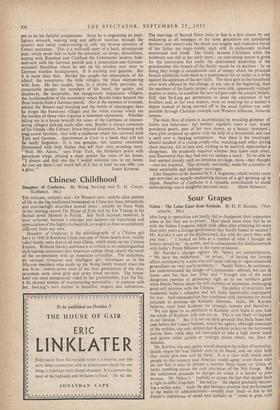Chinese Childhood
Daughter of Confucius.. By Wong Su-Ling and E. H. Cressy. ' (Gollancz. 16s.)
THE intricate, complex and—for Western eyes—utterly alien pattern of life in the big traditional homestead in China has been attractively and convincingly described several times ; notably by Nora Waln in her moving record The House of Exile and by Lin Yutang in his factual novel Moment in Peking. Any fresh account, however, is most welcome, because it enlarges and deepens our knowledge and appreciation of this highly civilised life, arranged on lines so completely different from our own.
Daughter of Confucius is the autobiography of a Chinese girl born in 1918 in Southern China into one of those closely-knit, strictly ruled family units dotted all over China, which made up the Chinese Empire. Without literary ambition it is written in an undistinguished style lapsing sometimes into American college slang, clearly the result of the co-operation with an American co-author. The authoress, an unusual, vivacious and intelligent girl, introduces us to the fifty-one members who made up the Wong family branch when she Was born : twenty-seven were of the four generations of the clan, Seventeen were slave girls and seven hired servants. The house- hold was most competently ruled by her grandmother, Lao Tai Tai, a fat shrewd woman of overpowering personality ; in contrast with her, Su-Ling's own mother is beautiful, elegant and submissive.
The marriage of Second Sister (who in fact is a first cousin by our reckoning as all members of the same generation are considered brothers and sisters) and the death and lengthy and expensive burial of her father are main events, each with its elaborately stylised ceremonial and ritual. The family became Christians while the authoress was still in her early teens ; no convincing reason is given for the conversion but under the determined leadership of the grandmother this branch of the family stands by its decision ; by so doing they forego a considerable sum of money which the principal branch .withholds from them as a punishment for or rather as a bribe against the adoption of the new faith. The slave girls in the household were more affected by this change, at any rate in the beginning, than the members of the family proper, who were able, apparently without qualms or stress, to combine the new religion with the ancient beliefs. Still, that Su-Ling got permission to share the education of her brothers and, at her own request, went on studying for a teacher's degree instead of being married off in the usual fashion was only possible through Christian example and Western influence, however remote.
The main flow of events is accompanied by revealing glimpses of habits and behaviour : her mother, regularly twice a year, drank powdered pearls, part of her own dowry, as a beauty treatment ; slave gitls conjured up spirits with the help of a broomstick and cast a spell over a sleeping companion. And there is the touchingly absurd incident of a young couple who, watching each other during choir practice, fell in love and, wishing to be married, approached a clergyman. He prudently inquired whether they knew each other, and discovered that they had not yet spoken a word. To be able to look seemed already such an immense privilege, more—they thought —was not required. This attitude, inevitably, made for a number of most unsuitable and unhappy marriages.
Like Daughter of the Samurai by E. L Sugimoto, which twenty years ago provided an equally enchanting picture of a girl growing up in Japan, Daughter of Confucius is a valuable contribution to social anthropology and a delightful personal story. HEIDI HEIMANN.


































 Previous page
Previous page